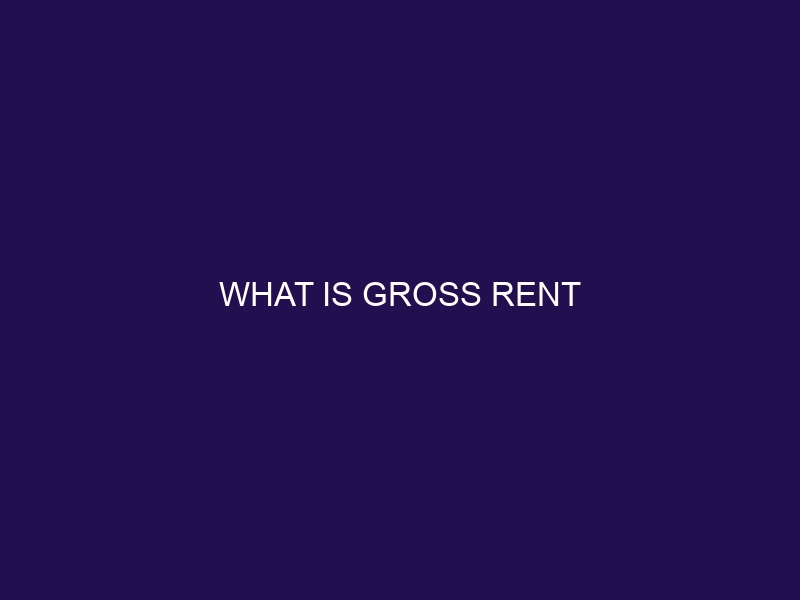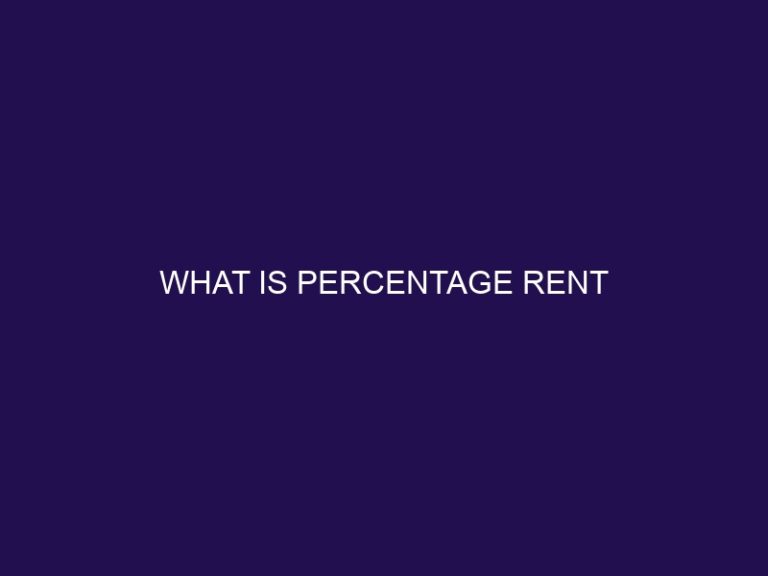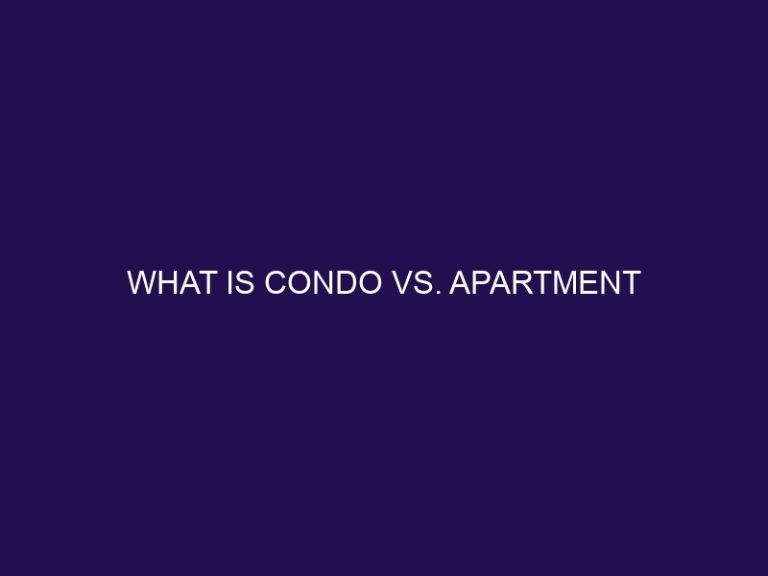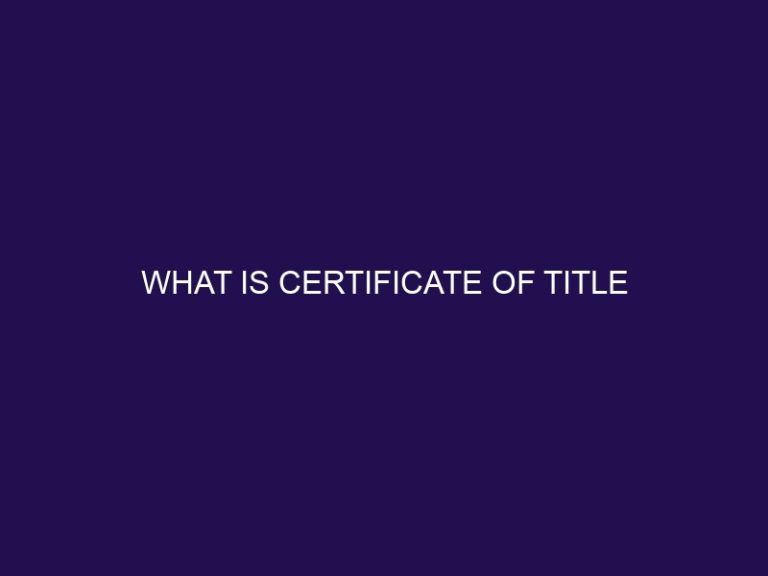What is Gross Rent
Understanding the concept of gross rent is essential for both tenants and landlords in the real estate industry. Gross rent refers to the total rent amount paid by a tenant to a landlord, including all expenses and fees associated with occupying a property. This comprehensive form of rent encompasses several components that need to be considered. Gross rent differs from net rent, which only includes the base rent amount without additional costs. Inclusions in gross rent typically cover utilities, maintenance fees, and property taxes. Conversely, exclusions from gross rent comprise expenses like insurance premiums and tenant-specific costs. Calculating gross rent varies between residential and commercial properties and requires specific considerations. While gross rent offers conveniences such as predictable expenses and simplified payment processes, it also has its drawbacks such as potentially higher costs. Understanding the role of gross rent in lease agreements is crucial, as modifications and rent increases may be based on this metric.
What is Gross Rent?
Gross rent refers to the total amount of money paid by a tenant to a landlord for the use of a property. It includes not only the base rent, but also any additional expenses or fees. What is Gross Rent? Gross rent is often used in commercial leases, where the landlord is responsible for paying property taxes, insurance, and maintenance costs. In residential leases, gross rent typically includes utilities and other expenses. Understanding what is included in gross rent is important for tenants to budget their housing costs accurately. It is advisable to clarify what is covered by the gross rent before signing a lease agreement.
Understanding the Components of Gross Rent
When it comes to understanding the components of gross rent, we need to dive into the key aspects that differentiate it from net rent, as well as the inclusions and exclusions within this rental agreement. Get ready to unravel the facts, figures, and events behind the world of gross rent. From financial considerations to lease specifics, we’ll explore the ins and outs of this topic, helping you navigate the complexities with ease. So, fasten your seatbelts and let’s demystify the world of gross rent!
Gross Rent vs. Net Rent
Gross Rent vs. Net Rent
Understanding the difference between gross rent and net rent is crucial for landlords and tenants in the context of property leasing and rental agreements. Here are the key distinctions:
- Gross rent: Gross rent refers to the total amount of rent charged for a property, including all expenses like maintenance fees, property taxes, insurance, and utilities. Tenants typically pay the gross rent in full, without worrying about additional costs.
- Net rent: On the other hand, net rent represents the base rent amount for a property, excluding extra expenses. Tenants who opt for net rent are responsible for paying separate costs, such as utilities, property taxes, insurance, and maintenance fees, in addition to the base rent.
Fact: It is important to carefully review the lease agreement to determine whether the stated rent is gross rent or net rent, as it can significantly impact the total cost of occupying the property.
Inclusions in Gross Rent
- Inclusions in Gross Rent are expenses that the landlord covers and includes in the total rent charged to the tenant. These expenses can vary depending on the lease agreement and the type of property.
- In some cases, the cost of utilities such as water, electricity, and gas may be incorporated in the gross rent.
- Landlords may cover the costs of routine maintenance and repairs as part of the gross rent.
- Some lease agreements include property taxes as part of the gross rent.
- Property insurance costs may also be included in the gross rent.
- If the property has common areas, such as a lobby or parking lot, the expenses for maintaining these areas may form part of the gross rent.
These inclusions in gross rent can provide convenience for tenants by simplifying their monthly payments. It is important for tenants to carefully review their lease agreement to understand exactly what is included.
Inclusions in gross rent have been a common practice in multi-unit residential properties throughout history. Landlords often include these expenses in the rent to ensure property maintenance and tenant convenience. This approach addresses the needs of both tenants and landlords, balancing affordability and effective property management.
Exclusions from Gross Rent
Exclusions from Gross Rent are expenses that are not included in the amount paid by the tenant. These expenses, which are typically the responsibility of the landlord or charged separately to the tenant, must be carefully considered when calculating the total gross rent. It is important to keep in mind the following exclusions:
- Utilities: The cost of water, electricity, gas, and other utilities are usually not included in the gross rent and are billed separately to the tenant.
- Maintenance and Repairs: Regular expenses for maintaining and repairing the property, such as fixing appliances or addressing damages, are typically the responsibility of the landlord.
- Property Taxes: Property taxes, while a significant cost, are generally not part of the gross rent and are paid by the landlord.
- Insurance: The cost of property insurance is usually excluded from the gross rent and falls under the landlord’s responsibility.
- Common Area Maintenance (CAM) Fees: In the case of commercial properties, expenses for maintaining shared spaces, such as parking lots or common areas, are often exempted from the gross rent.
Tenants should make it a priority to review their lease agreements in detail to ascertain which expenses are excluded from the gross rent. This ensures that they are fully aware of any additional costs for which they may be held responsible.
Calculating Gross Rent
Calculating Gross Rent is crucial for property owners and renters alike. In this section, we’ll delve into two sub-sections that provide valuable insights. First, we’ll uncover the process of determining Gross Rent in residential properties—a must-know for tenants and landlords seeking fair pricing. Next, we’ll explore the intricacies of calculating Gross Rent in commercial properties, where factors like lease agreements and additional expenses come into play. Get ready to unravel the math behind Gross Rent in both residential and commercial domains.
How to Determine Gross Rent in Residential Properties
To determine the gross rent in residential properties, follow these steps:
-
Calculate the total income generated from renting out the property, including rent payments and any additional fees or charges.
-
Identify the expenses that are included in the gross rent, such as utilities, maintenance costs, property taxes, and insurance.
-
Add up these expenses and subtract them from the total income to calculate the net operating income (NOI).
-
Divide the NOI by the gross rent multiplier (GRM), which is a ratio calculated by dividing the property’s sale price or value by the annual gross rental income.
-
The resulting number is the gross rent, which represents the total rental income before expenses are deducted.
To determine the gross rent in residential properties, these steps can be followed. Calculating the total income generated from renting out the property, including rent payments and any additional fees or charges is the first step. Next, the expenses that are included in the gross rent, such as utilities, maintenance costs, property taxes, and insurance, need to be identified. After that, these expenses should be added up and subtracted from the total income to calculate the net operating income (NOI). Finally, divide the NOI by the gross rent multiplier (GRM), which is a ratio calculated by dividing the property’s sale price or value by the annual gross rental income, to get the gross rent.
How to Determine Gross Rent in Commercial Properties
To determine gross rent in commercial properties, follow these steps:
- Begin by understanding how to determine gross rent in commercial properties. This can be done by calculating the total rentable area of the property. To do this, measure the length and width of each individual space and sum them up. This will give you the total rentable area of the property.
- Next, consider the rentable area percentage for common areas such as hallways, restrooms, and shared amenities. This percentage represents the portion of the total rentable area that is not directly used as individual space.
- Apply the rentable area percentage to the total rentable area that you calculated earlier. This will help you determine the rentable area of each individual space within the property.
- Once you have the rentable area of each space, multiply it by the agreed-upon rental rate per square foot. This will give you the base rent for each space.
- To obtain the total gross rent, add any additional charges or fees associated with the space. This may include common area maintenance or utilities charges.
Advantages and Disadvantages of Gross Rent
When it comes to gross rent, there are distinct advantages and disadvantages to consider. In this section, we’ll take a closer look at each side of the coin. We’ll explore the benefits that come with gross rent, as well as the potential drawbacks. By understanding the advantages and disadvantages, you’ll be better equipped to make informed decisions when it comes to your rental property. So let’s dive in and uncover the pros and cons of gross rent.
Advantages
- Stability: Gross rent offers advantages of stability for both landlords and tenants with a fixed monthly payment, making budgeting easier.
- No Additional Costs: Tenants can enjoy the advantages of not having to worry about additional costs such as property taxes, insurance, or maintenance expenses as they are included in the rent.
- Simplicity: With only one fixed payment, there is no need to track and manage multiple bills or expenses, providing advantages of simplicity.
- Easy Comparisons: It is easier to compare the cost of different rental properties since the total cost is clearly defined, which is an advantage.
- Less Disputes: Since all expenses are included in the rent, there are fewer possibilities for disputes between landlords and tenants regarding payment responsibilities, offering advantages in terms of reducing conflicts.
Choosing gross rent offers advantages of stability, simplicity, and eliminates additional costs for tenants, making it advantageous for those seeking a hassle-free renting experience.
Disadvantages
When considering the disadvantages of gross rent, it’s important to be aware of a few factors to keep in mind:
-
Hidden costs: Gross rent includes all expenses, which means tenants may end up paying for maintenance, repairs, or property taxes that they wouldn’t typically be responsible for under a net lease agreement.
-
Limited control: With a gross lease, landlords have more control over the property, including decisions about repairs, renovations, and upgrades. Tenants may have less influence over these decisions.
-
No incentives for energy conservation: Since tenants pay a fixed amount for rent, there is often no motivation to conserve energy or adopt sustainable practices, resulting in higher utility costs.
-
Potential for increased rent: Landlords may raise the rent in the future to offset rising expenses, leaving tenants with unexpected and potentially unaffordable rent hikes.
Gross Rent and Lease Agreements
When it comes to lease agreements, understanding the concept of gross rent is crucial. In this section, we’ll dive into the role of gross rent in lease agreements and explore how it affects both landlords and tenants. We’ll also touch upon gross rent modifications and rent increases, shedding light on the intricacies involved in these processes. So, if you’re curious about the ins and outs of gross rent and how it impacts lease agreements, keep reading!
Role of Gross Rent in Lease Agreements
The role of gross rent in lease agreements plays a crucial part for both landlords and tenants. Gross rent provides a simplified and predictable income stream for landlords. They can collect a fixed amount that covers all expenses, such as property taxes, insurance, maintenance, and utilities. This ensures that landlords have enough funds to effectively manage the property.
Tenants also benefit from gross rent as it allows for easier budgeting. They have a clear understanding of the total cost without worrying about additional expenses. This arrangement reduces the risk of unexpected bills and provides peace of mind to tenants.
In addition, gross rent simplifies the leasing process, promotes transparency, and fosters a mutually beneficial relationship between landlords and tenants.
Gross Rent Modifications and Rent Increases
When it comes to gross rent modifications and rent increases, there are a few important factors to consider. First, it’s crucial to review the terms and conditions of your lease agreement. This will outline the process for making modifications and any guidelines for rent increases. Landlords may typically increase rent annually or during specific intervals stipulated in the lease. Be aware of your rights as a tenant and consult local rental laws to ensure any gross rent modifications and rent increases are fair and legal. Communicating openly with your landlord and negotiating terms can also be beneficial in reaching a mutually satisfactory agreement.
Frequently Asked Questions
What is Gross Rent?
Gross rent refers to the fixed amount that tenants must pay per month for the duration of their lease agreement. It includes all expenses such as building maintenance, taxes, insurance, repairs, and renovations. Landlords cannot increase gross rent to accommodate unexpected expenses.
How does gross rent benefit tenants?
Gross rent can benefit tenants because unexpected repairs and maintenance issues are the responsibility of the property owner. By paying a predetermined rent amount, tenants don’t have to worry about rising utility costs or unplanned repairs, making budgeting easier.
What is the difference between gross rent and net rent?
Gross rent represents the total amount paid by tenants before deducting operating expenses. Net rent is the amount received by the landlord after subtracting expenses like taxes, maintenance, and insurance from the gross rental income.
Can gross rent vary over time?
No, gross rent is a fixed amount that tenants must pay per month for the duration of their lease agreement. Landlords cannot increase gross rent to accommodate unexpected expenses or changes in operating costs.
What should tenants consider when signing a lease agreement?
Tenants should carefully read and understand their lease terms to avoid any surprises. It is important to confirm what is included in the lease agreement, such as utility costs or maintenance fees, to properly budget for monthly expenses.
How does gross rent impact a property’s financial performance?
Gross rent affects a property’s financial performance by determining its gross rental income, which is a key metric for assessing the property’s true income potential. It helps landlords identify areas for improvement to attract new tenants and adjust marketing efforts to fill vacant units.







